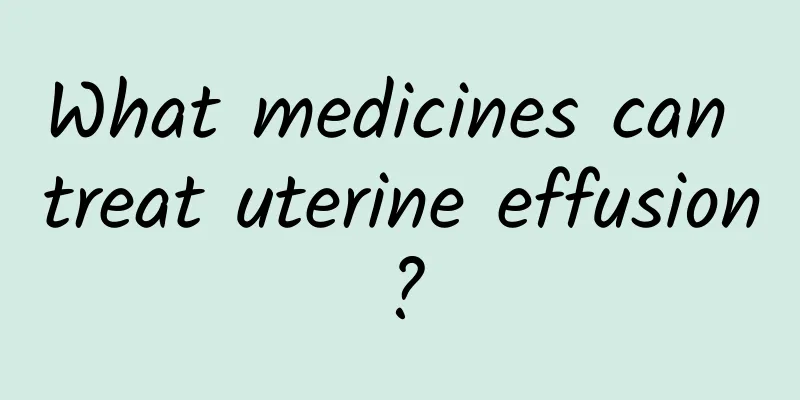What medicines can treat uterine effusion?

|
Uterine effusion is a common gynecological disease in women, which is mainly divided into physiological and pathological effusion. Generally speaking, physiological uterine effusion does not require treatment, while pathological uterine effusion is mainly caused by uterine effusion syndrome, which can lead to irregular menstruation, sexual dysfunction, infertility, etc., and requires scientific treatment. So what is the first choice of medicine for uterine effusion? If a woman visits a doctor because of abdominal pain and the B-ultrasound examination shows fluid accumulation, it can be clearly diagnosed as acute uterine effusion. If acute uterine effusion is not actively treated, it may develop into chronic uterine effusion, which may cause infertility, ectopic pregnancy, etc. in the future. In addition to anti-inflammatory treatment, pathological uterine effusion is treated with 5 mg of α-chymotrypsin or 1500 U of hyaluronidase, injected intramuscularly every other day, 5 to 10 times as a course of treatment, to facilitate the absorption of adhesions and inflammation. Some patients should stop taking the medicine when they have local or systemic allergic reactions. In some cases, antibiotics are used at the same time as dexamethasone, with 0.75 mg of dexamethasone taken orally 3 times a day. It is particularly important to pay attention to the gradual reduction of dexamethasone when discontinuing it. Generally speaking, the effect of simple drug treatment of uterine effusion is not ideal, and the course of treatment is long. Therefore, physical therapy should be combined with drug treatment. 1. General western medicine is mainly anti-inflammatory drugs. It is mainly used for the treatment of uterine effusion. At the same time, 5 mg of α-chymotrypsin or 1500 U of hyaluronidase are injected intramuscularly once every other day, and 5 to 10 times are a course of treatment to facilitate the absorption of adhesion and inflammation. In some cases, antibiotics and dexamethasone can be used at the same time, and dexamethasone 0.75 mg can be taken orally 3 times a day. When stopping the drug, pay attention to gradually reduce the dosage. 2. Traditional Chinese medicine is a good choice for treating uterine effusion. Uterine effusion is mostly caused by chronic uterine effusion inflammation. Traditional Chinese medicine has a very good effect in treating chronic diseases, and has a high cure rate, no recurrence, and treats both the symptoms and the root cause. |
<<: Can uterine effusion be treated with Chinese herbal medicine?
>>: What is the best medicine for treating uterine effusion?
Recommend
Experts analyze the main hazards of cervicitis
Cervicitis is one of the most common and frequent...
What is the diet for bilateral polycystic ovaries?
Bilateral polycystic ovary is a very harmful dise...
The three main causes of ovarian cysts
What causes ovarian cysts? This is a question tha...
Can acupuncture cure amenorrhea?
Acupuncture may help treat amenorrhea, but effect...
How to diagnose pelvic peritonitis
Women are the "half of the sky" of huma...
What tests should women take for premature menopause
Women who experience premature menopause need to ...
Spring Festival diet hides the risk of obesity and chronic diseases! Master the "Three Lows and One High" trick to avoid worries
The Lunar New Year is approaching, and it is a gr...
Environmental factors are generally the main cause of ovarian cysts
Environmental factors are generally the main caus...
Do you need anesthesia for abortion? There are two types
During the abortion operation, anesthesia is requ...
Preparation for 3mm chocolate cyst surgery
Usually, the main cause of chocolate cysts is the...
Parents should pay more attention to infant vaginitis!
Parents have all heard of infant vaginitis . But ...
Look carefully! Only two Clenbuterol testing laboratories have obtained international certification
Are private clenbuterol testing laboratories trus...
How to treat moderate cervical erosion? Several effective treatments for moderate cervical erosion
Cervical erosion is a common disease among women,...
Treatment principles for functional uterine bleeding
The treatment principles for functional uterine b...
Uterine bleeding is usually a manifestation of uterine fibroids.
Uterine bleeding is usually a manifestation of ut...









